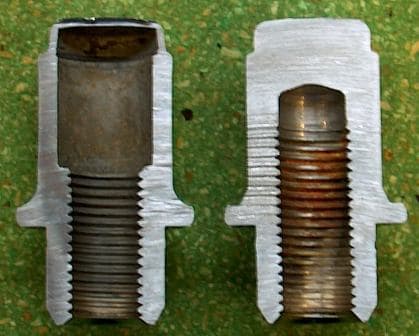
-----
Avoiding rust inside close holes during chrome plating
Q. Hi Sirs,
I have a big problem with our Cr/Ni plated products. We produce closed nuts and during chrome plating there's rust inside the threaded hole, our competitor doesn't have this problem. What's the method to avoid rust inside a closed hole during chrome plating?
Thanks in advance
Simone Lievore- PADOVA, ITALY
2004
A. A picture would help, Simone. Are you talking about acorn nuts?

Ted Mooney, P.E.
Striving to live Aloha
finishing.com - Pine Beach, New Jersey
Ted is available for instant help
or longer-term assistance.
Q. NO! The nuts we produce are steel nuts to fix the wheels to the hub of the cars. The hole is a threaded hole and it's closed in one side. During chrome plating red rust appears inside this hole. I think the rust is caused from the humidity inside the hole during the process. If you desire I can send you our sample and the sample of our competitor. Thanks in advance for your support!
Simone Lievore [returning]- Padova, Italy
2004
A. I can't use samples, but e-mailing photos for posting here to mooney@finishing.com would be good.

Ted Mooney, P.E.
Striving to live Aloha
finishing.com - Pine Beach, New Jersey
Ted is available for instant help
or longer-term assistance.
A. Hello Simone Lievore,
I'm a student but I think I can share my views with you people.
First before Ni/Cr plating you have to see clearly if the nut is rusted before your process starts.
Second if it is, then first rinse those nuts in commercial HCL. and then then use some cleaning agent to rinse them, and don't let them be in air, keep them in water, and then take it in your process Ni/Cr. hopefully results will be better.
p.s: First do it as samples.
Regards
Ahsen Salam- Karachi, Pakistan
Q. Dear Ted,
As you requested of me I send you the photos of a cross action of the nuts. On the right there's our production, on the left there's our competitor production. Please explain me why there's not rust on the thread of our competitor. In our nuts the rust already appears at the end of the process when operators remove the nuts from the frames. In the competitors nuts there's any type of coating inside the threaded hole, just steel. It's possible they tighten a cork in each nut to close the hole? If yes do you know some commercial solution to do this?

PADOVA, ITALY
2004
A. It is difficult to be positive about this from a photograph, Simone, but I do not believe that your competitor's nuts are stopped off for processing, rather I believe that they are phosphatized after plating whereas yours remain bare steel.
Also, his parts are fabricated by different processes, which might be affecting the metallurgy and corrosion resistance, but I still believe he is doing a phosphate post treatment which accounts for most of the difference.

Ted Mooney, P.E.
Striving to live Aloha
finishing.com - Pine Beach, New Jersey
Ted is available for instant help
or longer-term assistance.
A. Also if you have been plating a lot of iron or have an iron contamination problem with your tanks it will appear in low density plating areas and holes.
If that is the case, try dummying your tanks at very low amperage, around 15 amps per square foot and see if situation improves and use additives and filters to remove iron from system.
Steve ClarkEnglish Custom Polishing - Belfast, Maine, U.S.A.
A. I assume that your chromium has a fluoride based catalyst. The disadvantage of the fluoride is that it creates rust on the inside of tubes where the chrome does not cover the tube. You can find in the market, chromium plating solutions with catalyst that do not contain fluorides.

Sara Michaeli
Tel-Aviv-Yafo, Israel
Q, A, or Comment on THIS thread -or- Start a NEW Thread